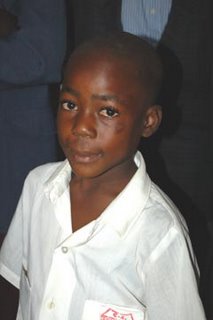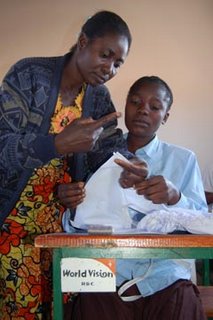 Ten-year-old Sapalo Satshilenge was walking peacefully along the relatively deserted and lonely country road in the pre-dawn darkness when there came, unexpectedly, a moment he would never forget.
Ten-year-old Sapalo Satshilenge was walking peacefully along the relatively deserted and lonely country road in the pre-dawn darkness when there came, unexpectedly, a moment he would never forget.He never heard the approaching motorcycle. It wasn't until some time after the motorcycle struck him that he learned exactly what had happened.
It wasn't that the motorcycle was silent. Most vehicles on such roads on the Congo make a lot of noise as they navigate, usually honking their horns every time they see a pedestrian to warn them that they have no intention of slowing down.
But for Sapalo, a deaf-mute, the warning of the oncoming danger was never received.
Fortunately, Sapalo survived the terrible accident, and now has scars on his head and elsewhere to show how lucky to be alive he really is. Many other pedestrians in similar situations haven't survived an accident on the Congo's treacherous roads, where any kind of emergency medical help, if it is available at all, is most likely many hours away.
Sapalo was on the road in the darkness because, like many of the deaf-mute students at the World Vision-assisted Ephrata school, they have no other option but to walk long miles to and from the school each day. Some students walk as far as 20 miles, each way, to reach the school, their only hope of living a life freed from the worst effects of the poverty that enslaves so many families in the Congo.
It is at Ephrata, which is one of four schools established for the deaf and mute in the Congo's enormous Katanga Province, that these students are taught not only a classical education but also valuable career skills such as sewing and carpentry.
 And they are taught something else as well: hope for a better life, both now and in eternity to come. For Ephrata carefully and strategically conveys Christian values to its students and isn't afraid to help equip them to grapple with what the Bible has to say about how to truly be successful in life, despite whatever disabilities you may be born with or accumulate along the way.
And they are taught something else as well: hope for a better life, both now and in eternity to come. For Ephrata carefully and strategically conveys Christian values to its students and isn't afraid to help equip them to grapple with what the Bible has to say about how to truly be successful in life, despite whatever disabilities you may be born with or accumulate along the way.Unfortunately, the vast majority of families of Ephrata's students are far too poor to figure out any better way to get them to and from school each day. In this part of the Congo, school buses are unheard of, and very few people own cars. Only the "upper crust" even own rudimentary bicycles, which are usually used like small trucks for conveying various goods to and fro for business purposes.
So most of the students walk the distance. And it is because of this walking, on very hazardous roads under poor conditions, that Sapalo was just one of two of Ephrata's students, in May alone, who were struck by vehicles in separate incidents.
To address the hazard, the leadership of Ephrata is hoping to build dormitory facilities on the school's ample land to house students during the week. They are seeking special funding for this project, and accumulating piles of bricks that will eventually be used in the construction.
World Vision is supporting Ephrata and the three other deaf-mute schools in Katanga Province, and their enthusiastic and hopeful students, in a variety of ways: with educational supplies, teacher training, desks, sewing machines, and more. This support is a vital investment in the future of the Democratic Republic of Congo, and that of many families and their disabled children in the Katanga Province.
Top photo: The marks of Sapolo's run-in with a motorcycle are evident on his face and head.
Bottom photo: One of Ephrata's teachers demonstrates a sewing technique to a female student.

1 comment:
Yes ,
The roads will have to be made safer .
Thank you for the update ,
L.B.
Post a Comment